
Industrial manufacturing company Ingersoll Rand (NYSE:IR) met Wall Street’s revenue expectations in Q3 CY2024, with sales up 7% year on year to $1.86 billion. Its non-GAAP profit of $0.84 per share was 3.2% above analysts’ consensus estimates.
Is now the time to buy Ingersoll Rand? Find out by accessing our full research report, it’s free.
Ingersoll Rand (IR) Q3 CY2024 Highlights:
- Revenue: $1.86 billion vs analyst estimates of $1.87 billion (in line)
- Adjusted EPS: $0.84 vs analyst estimates of $0.81 (3.2% beat)
- EBITDA: $532.7 million vs analyst estimates of $522 million (2.1% beat)
- Management reiterated its full-year Adjusted EPS guidance of $3.31 at the midpoint
- EBITDA guidance for the full year is $2.03 billion at the midpoint, in line with analyst expectations
- Gross Margin (GAAP): 43.8%, up from 42.5% in the same quarter last year
- Operating Margin: 19.1%, in line with the same quarter last year
- EBITDA Margin: 28.6%, up from 26.5% in the same quarter last year
- Free Cash Flow Margin: 20.1%, down from 21.2% in the same quarter last year
- Organic Revenue was flat year on year (6.4% in the same quarter last year)
- Market Capitalization: $39.25 billion
“Our Economic Growth Engine remains on track to deliver our long-term Investor Day targets of double-digit Adjusted EPS growth and strong free cash flow generation,” said Vicente Reynal, Chairman and CEO of Ingersoll Rand.
Company Overview
Started with the invention of the steam drill, Ingersoll Rand (NYSE:IR) provides mission-critical air, gas, liquid, and solid flow creation solutions.
Gas and Liquid Handling
Gas and liquid handling companies possess the technical know-how and specialized equipment to handle valuable (and sometimes dangerous) substances. Lately, water conservation and carbon capture–which requires hydrogen and other gasses as well as specialized infrastructure–have been trending up, creating new demand for products such as filters, pumps, and valves. On the other hand, gas and liquid handling companies are at the whim of economic cycles. Consumer spending and interest rates, for example, can greatly impact the industrial production that drives demand for these companies’ offerings.
Sales Growth
A company’s long-term performance is an indicator of its overall business quality. While any business can experience short-term success, top-performing ones enjoy sustained growth for multiple years. Regrettably, Ingersoll Rand’s sales grew at a mediocre 6.2% compounded annual growth rate over the last five years. This shows it couldn’t expand in any major way, a tough starting point for our analysis.
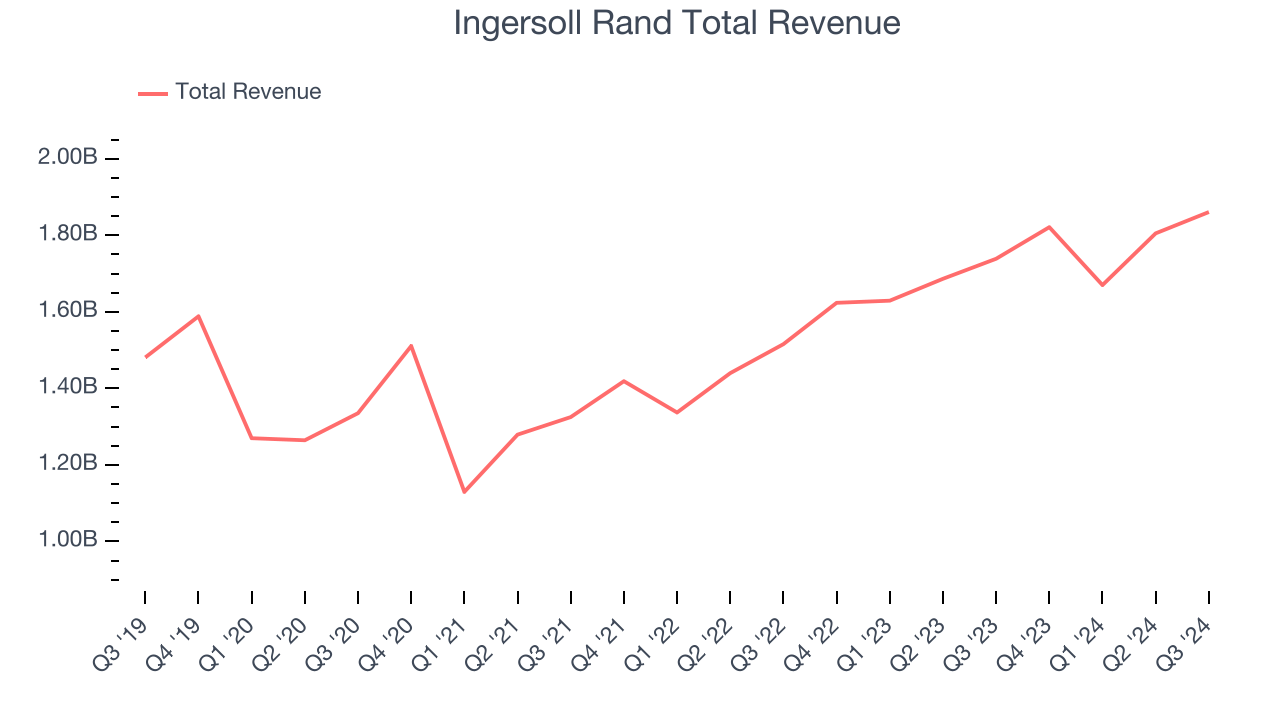
Long-term growth is the most important, but within industrials, a half-decade historical view may miss new industry trends or demand cycles. Ingersoll Rand’s annualized revenue growth of 11.9% over the last two years is above its five-year trend, suggesting its demand recently accelerated. 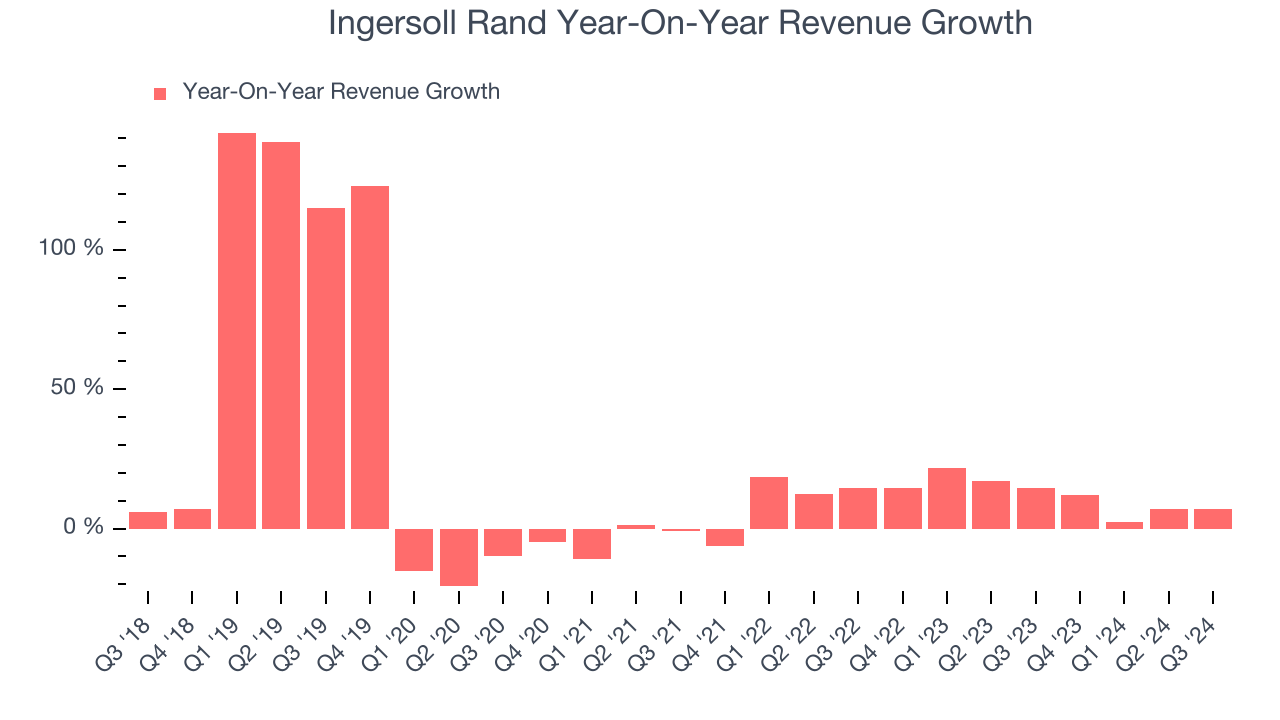
We can dig further into the company’s sales dynamics by analyzing its organic revenue, which strips out one-time events like acquisitions and currency fluctuations because they don’t accurately reflect its fundamentals. Over the last two years, Ingersoll Rand’s organic revenue averaged 7.8% year-on-year growth. Because this number is lower than its normal revenue growth, we can see that some mixture of acquisitions and foreign exchange rates boosted its headline performance. 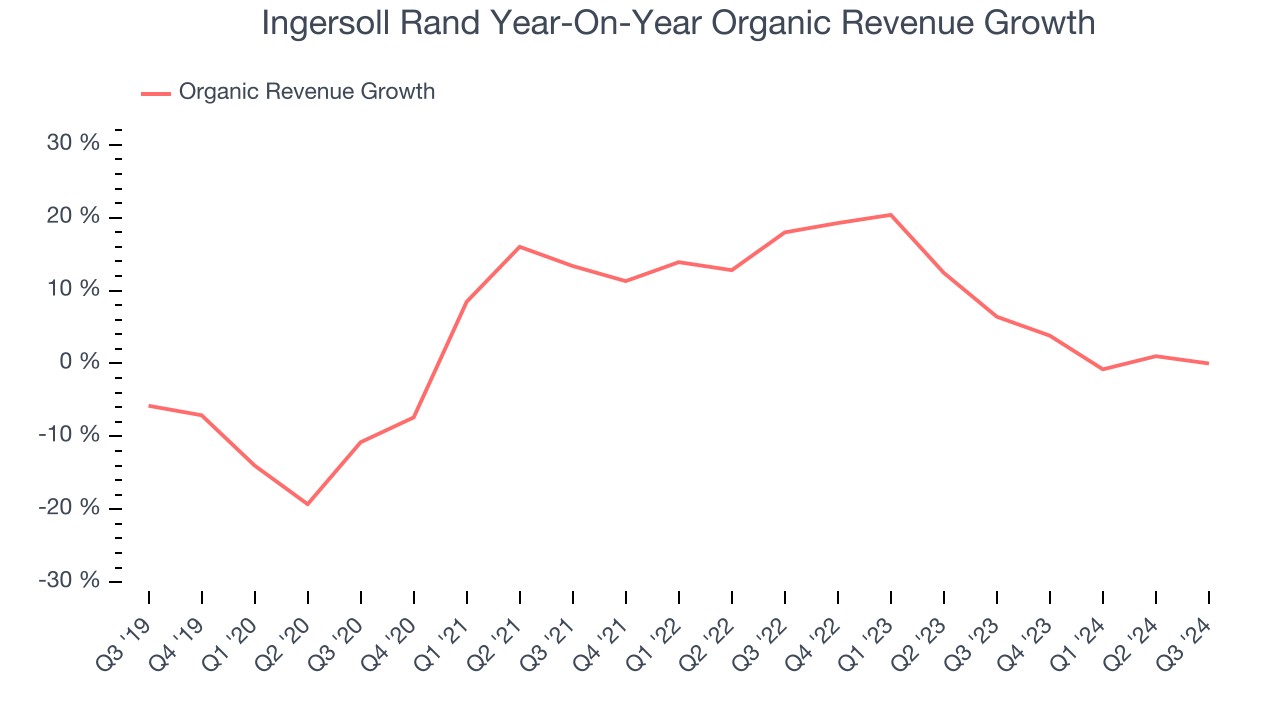
This quarter, Ingersoll Rand grew its revenue by 7% year on year, and its $1.86 billion of revenue was in line with Wall Street’s estimates.
Looking ahead, sell-side analysts expect revenue to grow 9.6% over the next 12 months, a slight deceleration versus the last two years. This projection is still healthy and shows the market sees success for its products and services.
Today’s young investors won’t have read the timeless lessons in Gorilla Game: Picking Winners In High Technology because it was written more than 20 years ago when Microsoft and Apple were first establishing their supremacy. But if we apply the same principles, then enterprise software stocks leveraging their own generative AI capabilities may well be the Gorillas of the future. So, in that spirit, we are excited to present our Special Free Report on a profitable, fast-growing enterprise software stock that is already riding the automation wave and looking to catch the generative AI next.
Operating Margin
Operating margin is an important measure of profitability as it shows the portion of revenue left after accounting for all core expenses–everything from the cost of goods sold to advertising and wages. It’s also useful for comparing profitability across companies with different levels of debt and tax rates because it excludes interest and taxes.
Ingersoll Rand has been an optimally-run company over the last five years. It was one of the more profitable businesses in the industrials sector, boasting an average operating margin of 11.8%. This result isn’t surprising as its high gross margin gives it a favorable starting point.
Analyzing the trend in its profitability, Ingersoll Rand’s annual operating margin rose by 17.6 percentage points over the last five years, showing its efficiency has meaningfully improved.
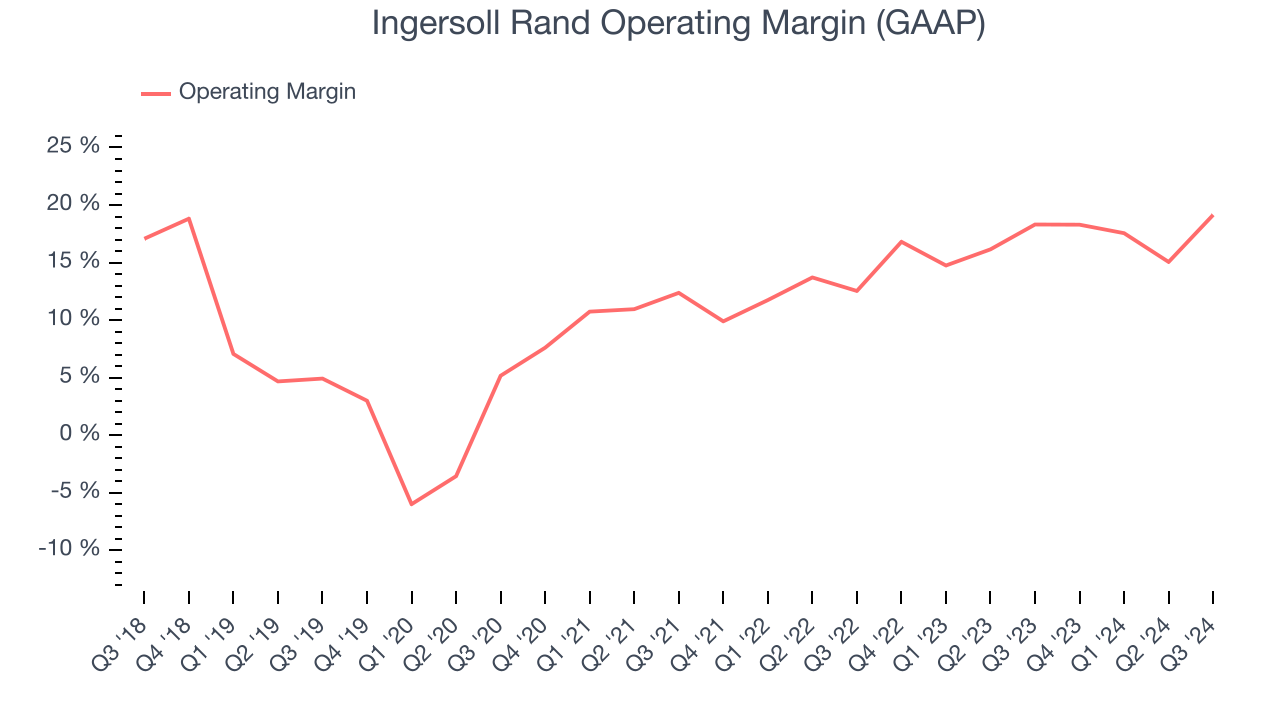
In Q3, Ingersoll Rand generated an operating profit margin of 19.1%, in line with the same quarter last year. This indicates the company’s cost structure has recently been stable.
Earnings Per Share
Analyzing revenue trends tells us about a company’s historical growth, but the long-term change in its earnings per share (EPS) points to the profitability of that growth – for example, a company could inflate its sales through excessive spending on advertising and promotions.
Ingersoll Rand’s EPS grew at a remarkable 13.3% compounded annual growth rate over the last five years, higher than its 6.2% annualized revenue growth. This tells us the company became more profitable as it expanded.
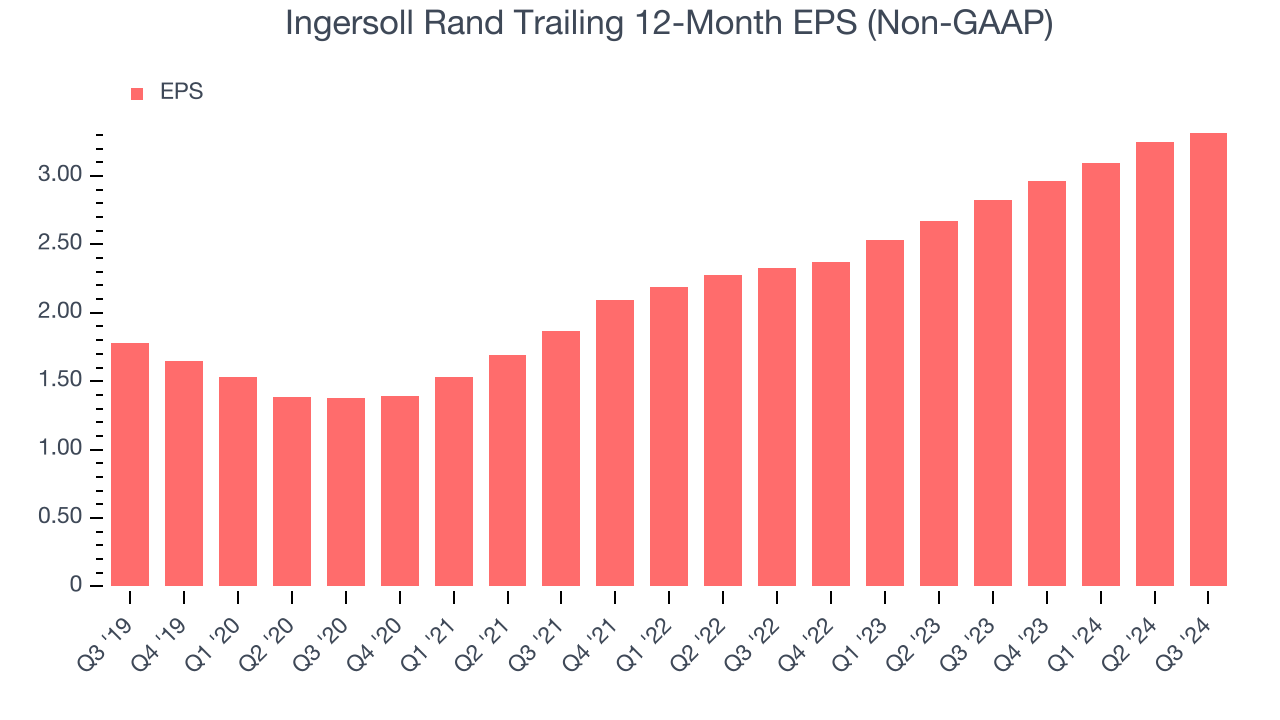
Diving into Ingersoll Rand’s quality of earnings can give us a better understanding of its performance. As we mentioned earlier, Ingersoll Rand’s operating margin was flat this quarter but expanded by 17.6 percentage points over the last five years. This was the most relevant factor (aside from the revenue impact) behind its higher earnings; taxes and interest expenses can also affect EPS but don’t tell us as much about a company’s fundamentals.
Like with revenue, we analyze EPS over a more recent period because it can give insight into an emerging theme or development for the business.
For Ingersoll Rand, its two-year annual EPS growth of 19.5% was higher than its five-year trend. We love it when earnings growth accelerates, especially when it accelerates off an already high base.In Q3, Ingersoll Rand reported EPS at $0.84, up from $0.77 in the same quarter last year. This print beat analysts’ estimates by 3.2%. Over the next 12 months, Wall Street expects Ingersoll Rand’s full-year EPS of $3.32 to grow by 7.7%.
Key Takeaways from Ingersoll Rand’s Q3 Results
It was good to see Ingersoll Rand beat analysts’ EBITDA and EPS expectations this quarter. On the other hand, its organic revenue fell short of Wall Street’s estimates. Overall, this was a softer quarter. The stock traded down 2.1% to $93.99 immediately after reporting.
So do we think Ingersoll Rand is an attractive buy at the current price? The latest quarter does matter, but not nearly as much as longer-term fundamentals and valuation, when deciding if the stock is a buy. We cover that in our actionable full research report which you can read here, it’s free.
